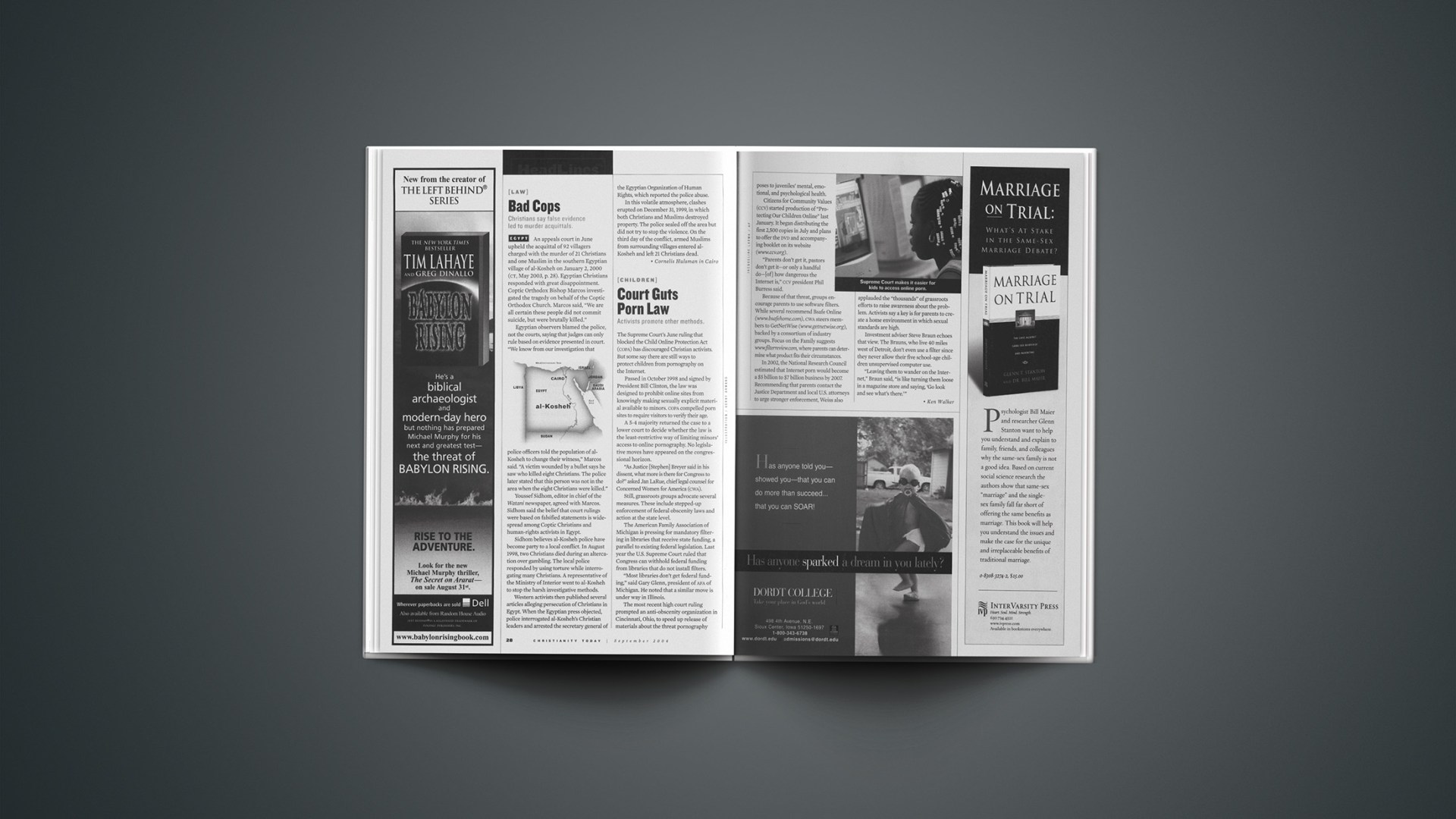The Supreme Court’s June ruling that blocked the Child Online Protection Act (COPA) has discouraged Christian activists. But some say there are still ways to protect children from pornography on the Internet.
Passed in October 1998 and signed by President Bill Clinton, the law was designed to prohibit online sites from knowingly making sexually explicit material available to minors. COPA compelled porn sites to require visitors to verify their age.
A 5-4 majority returned the case to a lower court to decide whether the law is the least-restrictive way of limiting minors’ access to online pornography. No legislative moves have appeared on the congressional horizon.
“As Justice [Stephen] Breyer said in his dissent, what more is there for Congress to do?” asked Jan LaRue, chief legal counsel for Concerned Women for America (CWA).
Still, grassroots groups advocate several measures. These include stepped-up enforcement of federal obscenity laws and action at the state level.
The American Family Association of Michigan is pressing for mandatory filtering in libraries that receive state funding, a parallel to existing federal legislation. Last year the U.S. Supreme Court ruled that Congress can withhold federal funding from libraries that do not install filters.
“Most libraries don’t get federal funding,” said Gary Glenn, president of AFA of Michigan. He noted that a similar move is under way in Illinois.
The most recent high court ruling prompted an anti-obscenity organization in Cincinnati, Ohio, to speed up release of materials about the threat pornography poses to juveniles’ mental, emotional, and psychological health.
Citizens for Community Values (CCV) started production of “Protecting Our Children Online” last January. It began distributing the first 2,500 copies in July and plans to offer the dvd and accompanying booklet on its website (www.ccv.org).
“Parents don’t get it, pastors don’t get it-or only a handful do-[of] how dangerous the Internet is,” CCV president Phil Burress said.
Because of that threat, groups encourage parents to use software filters.
While several recommend Bsafe Online (www.bsafehome.com), CWA steers members to GetNetWise (www.getnetwise.org), backed by a consortium of industry groups. Focus on the Family suggests www.filterreview.com, where parents can determine what product fits their circumstances.
In 2002, the National Research Council estimated that Internet porn would become a $5 billion to $7 billion business by 2007. Recommending that parents contact the Justice Department and local U.S. attorneys to urge stronger enforcement, Weiss also applauded the “thousands” of grassroots efforts to raise awareness about the problem. Activists say a key is for parents to create a home environment in which sexual standards are high.
Investment adviser Steve Braun echoes that view. The Brauns, who live 40 miles west of Detroit, don’t even use a filter since they never allow their five school-age children unsupervised computer use.
“Leaving them to wander on the Internet,” Braun said, “is like turning them loose in a magazine store and saying, ‘Go look and see what’s there.'”
Copyright © 2004 Christianity Today. Click for reprint information.
Related Elsewhere:
Congress has the text of the Child Online Protection Act online.
Christianity Today‘s coverage of the law includes:
Weblog: Supreme Court Rejects Internet Porn Law, Promotes Filters | Religious groups outraged over Supreme Court’s Internet porn decision (June 30, 2004)
Good Idea, Fallible Filters | Why even free-speechers liked the Children’s Internet Protection Act. (A Christianity Today editorial, Feb. 20, 2001)
News elsewhere on the ruling includes:
Court rejects Internet porn law | The Supreme Court yesterday barred the Justice Department’s enforcement of a law aimed at keeping Internet pornography from children, saying it was likely unconstitutional when remanding it to a federal court for a new trial to resolve the issue. (Washington Times, June 30, 2004)
Court: COPA Injunction Stands | The U.S. Supreme Court on June 29 upheld a lower court’s injunction blocking the Child Online Protection Act (COPA), which would fine commercial web site operators if they did not require an age verification (such as a credit card) to look at sites deemed “harmful to minors.” (Library Journal, Aug. 15,2004)
Porn bests political speech | When commercial depictions of sexual acts or organs intended to arouse are more scrupulously protected than issue advertising in federal elections, the First Amendment has been turned on its head and folly has been crowned. (Bruce Fein, Washington Times, July 19, 2004)










